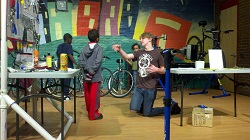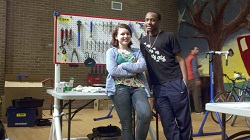Chain Reaction: Boston’s First Mobile, After-School Bike Shop and Training Center
Source: Pedestrian and Bicycle Information Center (PBIC)
Problem
Bicycling is one of the healthiest and least expensive modes of transportation, so why is bicycling not more prevalent in low income urban areas? In Boston, many low income neighborhoods have low rates of bicycle usage, likely as a result of the lack of access to good quality inexpensive bicycles and bicycle repair and a lack of bicycle facilities.
Background
Several teen employees of Bikes not Bombs, a nonprofit based in Boston, Massachusetts, recognized the need for cheap bicycle repair and low-cost bicycles in low income areas over the course of their involvement with the nonprofit. With the goal of making bicycling more affordable and accessible to children and adults, they created a short video and entered their idea, entitled Chain Reaction, in the “Banking on Youth” competition.
Solution

Sarah Braker / Bikes Not Bombs
Conceived by the Consumer Bankers Association and Ashoka Ventures, the “Banking on Youth” competition organizes local funders to provide small grants to youth projects around the country. Using the bike repair capacity and infrastructure already in place within the Bikes not Bombs organization, the Chain Reaction founding members proposed a mobile bicycle repair shop that would refurbish and sell bikes and would also provide low-cost bicycle maintenance. In contrast to other community-based bicycle cooperatives, Chain Reaction is a mobile initiative and can set up their repair station in moments, allowing mechanics to reach populations not served by bicycle shops. In June 2012, Chain Reaction was awarded a seed grant of $1,000 by Citizens Bank through the “Banking on Youth” competition to expand their program. Based on the fact that the program has the potential for a large impact, but is mobile, uses youth mechanics, and has a low start-up cost, the funding has the potential to really expand the program and increase the program’s impact.
With the system for processing donated bikes already in place as part of the Bikes not Bombs organization, the main cost in starting the Chain Reaction initiative was purchasing tools and bike stands. Following a fundraiser to build tool stands out of PVC pipe, this cost was mostly offset, while parts were usually obtained from donated bikes. The normal bike repair process at Bikes not Bombs is to strip down the entire bike and use all new components. For Chain Reaction, most of the serviceable components on donated bikes are reused or left on the bike, though the organization does purchase new tubes, tires, chains, housing, cables, and brake pads. Labor costs are also not onerous, as the hours needed for the youth mechanics are shifted from another Bikes not Bombs program and, as youths age out of the program, new youth mechanics are brought in from other Bikes not Bombs programs every year. As such, tools and materials were the only major expenses in starting the Chain Reaction initiative.
Despite relatively small startup costs, organizers were wary of expanding too quickly to avoid overextending the program. Apart from providing low cost bikes and bike maintenance, one of the goals of the initiative is to build and establish the capacity in the community to continue the program. With three or four neighborhoods without access to a bike shop, limited labor hours, a short timeframe, and a small budget, the teen organizers needed to manage their funding carefully and ensure that their focus is on helping people learn bicycle mechanics in order to continue the Chain Reaction initiative in the future. To help develop this capacity, the program included a “Learn-It, Earn-It” element, whereby bike owners team with a mechanic and learn how to fix their bikes free of charge.

Sarah Braker / Bikes Not Bombs
Chain Reaction mechanics decided to base their initiative out of the Boys & Girls Clubs in Roxbury and Dorchester, which not only provide adequate space, but are also accessible and safe locations for residents of these communities, particularly children. By partnering with the Boys & Girls Clubs, Chain Reaction was able work with a reputable organization in the eyes of the community and garner community trust and support for the program.
The teen organizers were quick to recognize that not only did these communities lack bicycles, they also lacked bike locks and helmets and even places to lock their bikes. The group began to work with the city and other funders to find helmets and locks; Chain Reaction is able to sell helmets and locks for $10 each, due to this partnership. If $10 is still too expensive, a similar program to the “Learn-It, Earn-It” model exists, so people can work for a helmet. Bikes not Bombs and the City of Boston have a good working relationship and often cooperate to meet the needs of potential cyclists who don’t have the means to purchase a bicycle, helmet, or lock.
A secondary goal of the initiative is to educate people about bikes, with the hope that people will bike more and will become politically active in demanding bike facilities in their neighborhoods. The first question, after becoming a bicycle owner, is often “where can I safely ride and park my bicycle?” Without facilities that safely accommodate bicyclists, it is difficult to motivate people to ride. By including the message of public participation and emphasizing the need for local pressure to demand bicycle facilities, Chain Reaction is not only providing bicycles, but also building a political base to support bicycling in the city. Sarah Braker, a Youth Development Specialist with Bikes not Bombs, mentioned that the organization was uncomfortable with the traditional “build it and they will come” rhetoric and wants to encourage the beneficiaries of the program to advocate for more bicycle facilities in their community, a bottom-up, instead of top-down, approach.
Results

Sarah Braker / Bikes Not Bombs
Overall, the Chain Reaction program has fixed roughly 40 bikes and sold at least 20 since the program began in early 2012. Over the life of the program, it gradually became clear that the original start price of $80 was too high for many people, so most bicycles are sold for between $40 and $60. All maintenance and refurbishing work is completed by youth mechanics. The organizers also noticed that many of the repairs were very simple, from flat tires to loose quick releases. People were often just one small repair away from a working bicycle.
It also became clear that there are a lot of misconceptions about who wants to bike and why. One major concern is that there are not nearly enough bike racks in Boston. Without a safe and convenient place to park a bike, people don’t feel comfortable biking, something that the Chain Reaction organizers are aware of. By using the program to educate people about bikes, they hope that residents of these low income neighborhoods can mobilize as a political force to petition the city to install more bicycle infrastructure.
Chain Reaction organizers, as mentioned before, are stretched relatively thin with three or four neighborhoods without access to a bike shop, limited hours of operation, a short timeframe, and a small budget. However, costs continue to remain low, with graduating youth mechanics replaced by other youth mechanics from within the Bikes not Bombs organization. With increasing participation in the program in low income neighborhoods, organizers are hopeful that the program will continue and eventually be sustained by the community itself.
The program has received plenty of local media attention in Boston. With this increasing media exposure, the program looks likely to continue in Boston, while other communities are surely taking notice. The Bikes not Bombs organization hopes that the positive experience that youths take from the program will influence them to begin similar programs in other communities.
Contact
Sarah Braker
Youth Development Specialist & Grant Writer
Bikes Not Bombs
284 Amory St., Jamaica Plain, MA 02130
617-522-0222 ext. 104
www.bikesnotbombs.org/youth
References
Boston Biker. (2012, August 17). Chain Reaction Gets Grant! [Blog Post]. Retrieved from http://bostonbiker.org/2012/08/17/chain-reaction-gets-grant/.




